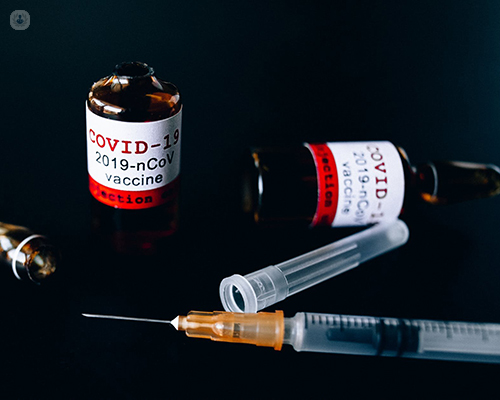Nervous about the coronavirus vaccine? Here’s how to overcome needle phobia!
Written by:As the UK is well on its way with the COVID-19 vaccine rollout*, those who have a fear of needles may be feeling a little anxious for when they are next in line for the coronavirus vaccine. Having needle phobia, however, is nothing to be ashamed about and is something that a professional can help you to address. Here, consultant health psychologist Dr Sue Peacock gives her top tips on how you can overcome your fear of needles.

Why might some people have a fear of needles?
Needle phobia is extremely common, affecting at least one in 10 people. Often people who have needle phobia have had many blood tests or procedures as a child, so fear of needles and injections sometimes, but not always results from bad memories of this in earlier life.
Many people do not confront their fears because they are embarrassed. Often people do not faint or feel faint, but do feel panicky when their fear is triggered. Having a vaccination can help protect you against serious diseases, so it is important to get vaccinated.
What are your top tips for those who have a fear of needles?
The following are some techniques that I recommend you try before, during and after your appointment:
Before an appointment
Hypnosis
Hypnosis and self-hypnosis are ideally placed to deal with this problem. The aversion to needles has become ingrained on the needle phobic's unconscious, as a result of some distressing past experience which left a powerful impression which then subsequently grew to a highly irrational and potentially damaging extent.
Hypnosis first involves getting yourself or being helped into, a calm and relaxed state. While in a state of mental and physical relaxation the unconscious becomes open to the benefits of positive suggestions and mental imagery which, in the case of this phobia would be directed towards neutralizing and alleviating the deeply ingrained fear relating to needles, ultimately erasing that fear and leaving you with a practical and rational attitude towards needles and injections.
In addition, hypnosis can massively boost confidence to deal head-on with taking a vaccination which as a hypnotherapist I incorporate in sessions with clients. Weirdly, it is also possible to reframe the experience of having a vaccination, turning it into a comedy sketch. An excellent hypnosis download has been created to deal with this specific phobia, which you can access here.
Breathing techniques
If you get panicky, try practising a calming breathing technique. Try and do this three times a day for up to a week before your appointment:
- Sit up straight in a comfortable position and let your shoulders and jaw relax. Put one hand low on your stomach.
- Breathe in slowly and deeply through your nose and out through your mouth. Breathe as deeply as feels comfortable.
- Do this for five breaths.
Applied tension
If you are worried about fainting, try this applied tension technique which helps your blood pressure get back to normal. Try and do this three times a day for up to a week before your appointment:
- Choose somewhere comfortable to sit.
- Tense the muscles in your arms, upper body and legs for 15 seconds.
- Release the tension and sit comfortably again.
- After 20-30 seconds tense your muscles again.
- Repeat this five times.
During your appointment
Different techniques work for different people and can include:
- Chat: let the person who is giving you the jab know if you have concerns – there is nothing to be embarrassed about. They can help you to relax and distract you by talking to you. They will be able to answer any specific questions you have to put your mind at ease. Don’t worry they won’t think you are a wimp or be annoyed with you.
- Relax: this will release tension in your muscles. Tense muscles may make injections more painful.
- Breathe: focus on your breathing, deep, steady breathing can help you relax.
- Distract yourself: don’t look at the needle if it scares you. Bring a book or a magazine or look at favourite photos/videos on your phone. Think about your favourite place and describe it to yourself.
- Listen to tailored comedic audio, which is aligned to having a vaccination. When you are smiling the anxiety will be so much less.
After your appointment
I recommend that you give yourself a reward after your jab; why not try a relaxing bath or watching your favourite film?
You can book an appointment with Dr Peacock via her Top Doctor’s profile here today if you need someone to talk to during these difficult times.
*The information in relation to the coronavirus pandemic is in regards to what is happening at the time of publication and is subject to change*


